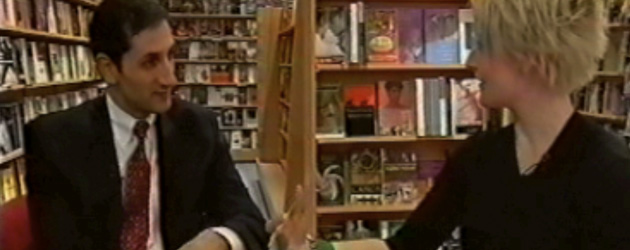
![]()
Jonar Nader speaks about his target-market and why his readers find his books exhausting. At first, he thought that his readers would be corporate executives. Later he started to receive fan-mail from 14 years olds, all the way to 90 year old, from every corner of the world. The audio contains background noise due to the location. Further below is a transcript of the video.
![]()
Low-res version 7 Mb 4 mins
[flashvideo file=wp-content/uploads/Video_Streams/Jonar_Nader_Why_his_books_are_exhausting_Low_res.flv /]
![]()
High-res version 14 Mb 4 mins
[flashvideo file=wp-content/uploads/Video_Streams/Jonar_Nader_Why_his_books_are_exhausting_Hi_res.flv /]
![]()
Here is the transcript:
Female: Now, you’ve got your book here. You’re quite sort of controversial but How to Lose Friends and Infuriate People. Interesting title but we’ll get more on the title a little bit later on. First of all, who is this book targeted to?
Jonar Nader: Well initially, it was targeted to people who are let’s say, around 21 to 40 who have gone through the mill of obtaining supposed credentials, who have done everything that societies tell them to do and then they say, ‘Hang on. I haven’t really lived. I don’t – I haven’t reclaimed my life. I’m not happy. I’m supposedly a manager.’ And so, it’s targeting those people who really want to take that next step to reclaim their life. But strangely enough, the fan-mail I get daily are from people for who were like 90 who are ex-army generals or ex-CEOs saying, ‘I wish I had this book when I was growing up.’
Female: Really?
Jonar Nader: And a 14-year-old girl wrote most fantastic things that she read it and it was just so important to her and she’s forcing her parents to read it. So now therefore, I realized my audience is, you know, 14-year-olds to 90-year-old, people who are both in corporate life and government and so on. It wasn’t actually written with a target in mind. You know, I didn’t say I would go after this demographic. It was written with the kind of person in mind, the people who are sick and tired of the lies and the stupidity and the hype that keeps going around time after time after time. And it actually offers some really sound wisdom and it also provides some clear advice. However, it really doesn’t give you any solutions because the book engages the reader to come up with the right solution. So, that’s why some people read the book and say, ‘Gosh, I’m exhausted.’ You know, because it really does make you think and that’s why I say, ‘Don’t read more than one chapter at a time.’
Female: Because one thing that strikes me when I was reading is you read the page and you’ll say, ‘Yes. I’ve noticed that my whole life but it’s now sort of clear to me as to what’s just happening.’
Jonar Nader: Yes.
Female: And you’ve got it on the front here. You got to read it – read it twice and read between the lines. Well, what does this sort of mean?
Jonar Nader: Okay. You know like there’s a – there’s some books out there that you can read them every year and every year, you benefit from them. Even like some comedy. You know, there’s some like I love British comedy and I can watch certain British comedy that has been out since 1930, 1950 and every time I watch the tape, I laughs at the brand new joke I’ve never seen before because it is rich and full. This book is rich and full with wisdom but it actually is useless until you combine it with our wisdom. But as you grow up year and year, you’re combining it with new wisdom. So, the book is like this magnet and you bring your wisdom to it. And that’s why I say, if you read between the lines, meaning, interrogate yourself, ask yourself, really look at things, don’t just read words, you’ll see more and more and more because it’s engaging. Yes.
Female: And so, there’s really nice way to sort of think about it that way. That it’s sort of partly your own book as well. That’s what you’re bringing. You’ve sort of started the catalyst for your own – the reader’s thoughts.
Jonar Nader: It asks the right questions. You see, I have this philosophy that says, if you ask the wrong question, you’ll get the wrong answer. And if you don’t understand the question, you won’t understand the answer. And so, I hopefully ask the right questions. I have – I used to teach a lot and the first year of teaching, at the end of it, my students said, ‘I’m not sure what we learned, sir.’
Female:
Jonar Nader: And I felt somewhat offended because I thought, why is it – you know, I put so much work into this and you’re telling me you’re not sure what you learned. But I – so the next year, what I did is the very first day of the semester, I gave them last year’s test and most of them got 20%. At the end of the year, they got the full on exam and they got 80%. So, I could see that they had learned something but my teaching style is so that actually people end up earning the knowledge. I don’t say one plus one is two. I say, what do we mean one? Why are we combining them and so on? And so, we go through the process of trying to understand what we are dealing with and you will arrive at two. I won’t tell you it’s two. And then you will think you earn the knowledge. And at the end of it, you’ll say, ‘Well we’ve known this. What are you telling me?’ And that’s the greatest thrill really for a lecturer or a teacher.
Female: And I – you know, it makes a lot of sense.

Comments are closed.